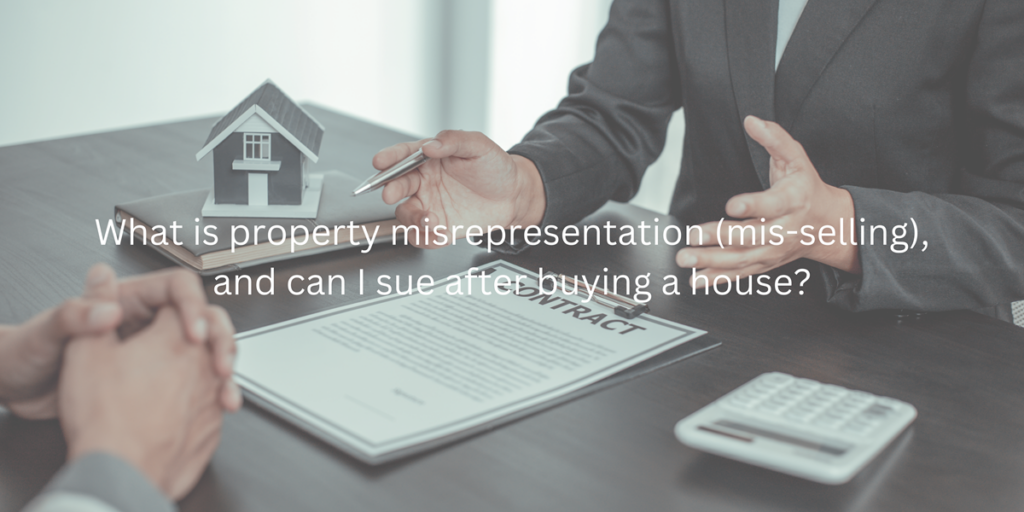Property misrepresentation disputes - a complete guide

Our experienced solicitors help homeowners to resolve property misrepresentation disputes, which usually arise after a seller misleads a buyer during a sale process.
There are a number of reasons why this might have happened. Whether your circumstances relate to flooding, a dispute with a neighbour, structural problems or something else entirely, our solicitors understand that property misrepresentation disputes can be stressful for all involved. Our expertise and guidance will help to reduce that stress and maximise your chances of successfully resolving the issue.
Contact us for an initial consultation to discuss your situation in detail.
Contact usFrequently asked questions
Click on the links below to jump to the different questions.
- What is property misrepresentation (mis-selling), and can I sue after buying a house?
- What is the Misrepresentation Act 1967?
- How much compensation could I receive for property misrepresentation?
- How long do property misrepresentation cases take?
- What is a TA6 or SPIF disclosure form?
- What happens if a house seller does not disclose something?
- Could a buyer bring a claim if a house seller lied about flooding, leaks, structural problems, Japanese knotweed or damp, for example?
- Can I claim if a house seller didn’t report a dispute with a neighbour?
- What happens if the seller’s replies were accurate at the time they were given to the buyer, but by the time of exchange the information has changed?
- What do our clients say?
What is property misrepresentation (mis-selling), and can I sue after buying a house?

Property misrepresentation occurs when you buy a property, and the seller lies or misleads you during the sale process. If this happens, you may have a property misrepresentation claim against the seller.
The first thing to establish is whether you have suffered any loss as a result of the seller lying or misleading you, such as the property value being less than what you bought it for as a consequence.
What is the Misrepresentation Act 1967?

The Misrepresentation Act 1967 was created to help parties in circumstances where they suffer a loss as a result of misrepresentation.
Representations are statements made by one party to another which could be relied upon when entering into a contract. If those statements prove to be incorrect and induces Party B to enter the contract, then they are considered to be misrepresentations. There are a number of factors which need to be considered when assessing with a statement is a term or a representation, such as intention, timing, importance and knowledge.
There are three types of misrepresentation, namely;
- innocent,
- negligent, and
- fraudulent.
Fraudulent is the most serious type of misrepresentation and can give rise to substantial and potentially serious consequences.
How much compensation could I receive for property misrepresentation?

The level of damages will depend on the type of misrepresentation. Generally, the rule is that the damages should compensate the claimant for the loss which has been suffered.
As such, each case is dealt with on a case-by-case basis, and it is unlikely for any two cases to be the same. It may be that it is appropriate to consider the diminution of value in the property, being the difference between the purchase price and the actual value of the property knowing the issue which has arisen as at the date of the purchase.
To discuss the level of damages you may be able to claim for a misrepresentation, please contact our property specialists.
How long do property misrepresentation cases take?

It is difficult to estimate how long a case of this type will take as it varied on a case-by-case basis. However, in our experience, claims for misrepresentation often settle without requiring court proceedings to be issued. This means that it largely depends on the engagement and response from the seller.
Additionally, parties typically have six years to bring a misrepresentation case, under the Limitation Act 1980, from the date of the breach.
What is a TA6 or SPIF disclosure form?

A SPIF or TA6 form is a property information form which is completed by a property seller and provided to the buyer during the sale process.
The form provides crucial information to the buyer, such as details about the property, details of any disputes which have occurred, boundaries and ownership, utilities and services, insurance, etc.
What happens if a house seller does not disclose something?

If the property seller does not disclose something on the TA6 form or during the sale process, meaning they make a statement which is untrue during the enquiries stage or on the TA6 form, it may be considered a misrepresentation.
Parties should ensure that when making statements, providing opinions or completing documents during the process, that they are confident that it is correct to the best of their knowledge. If something is not disclosed correctly, or there was clear evidence of concealment, and the buyer later finds out about it, this could give rise to the buyer having a claim for misrepresentation which could result in recission of the contract or payment of damages.
However, if something is simply not disclosed because no question was put to the seller in which they would need to disclose it, this would be unlikely to lead to a claim for misrepresentation. Usually, these circumstances are governed by ‘caveat emptor’ (buyer beware).
Could a buyer bring a claim if a house seller lied about flooding, leaks, structural problems, Japanese knotweed, damp, etc.?

As set out above, if the seller has misrepresented any aspect of the property or information about the property during the sale process, then the buyer may have a claim for misrepresentation.
Some cases are easier to establish misrepresentation, such as if the seller knew that the property had been flooded but lies on the Seller’s Property Information Form or TA6 in stating that the property had not previously flooded.
As is commonly the case, if Japanese Knotweed is found in the property, despite the seller indicating on the TA6 form that there wasn’t any, this can give rise to a substantial misrepresentation claim. This area can be complex and should be dealt with by specialists, especially given the nature of Japanese Knotweed.
If you think that your seller has misrepresented the property or information about the property, contact our property disputes specialists today to discuss whether you may have a claim.
Can I claim if a house seller didn’t report a dispute with a neighbour?

Yes, it is possible that a buyer may be able to bring a claim against the seller if a dispute with a neighbour is not disclosed. We have experience with settling cases of this type, where there has been a dispute with a neighbour which has subsequently not been disclosed.
The TA6 form specifically asks the seller whether there has been any dispute with a neighbour, and so if this is not correctly answered then it could give rise to a claim for misrepresentation.
What happens if the seller’s replies were accurate at the time they were given to the buyer, but by the time of exchange the information has changed?

It’s typically considered that any statements or representations provided by the seller during the pre-contract enquiries or sale process, will likely be treated as accurate and up-to-date until the contract is exchanged. If a statement becomes untrue, the seller should inform the buyer and correct it.
If there is an additional requirement under the contract or within any standard forms to update any statements or representations if they become untrue, then then this poses an additional obligation to ensure that all statements or replies are accurate.
Any update should be communicated to the buyer prior to the exchange of contracts.
What do our clients say?
“We have recently used Willans for a misrepresentation of sale case. Our particular case was very complicated and we appreciated the honesty that things may not go our way. Although we knew it would be a long road, I feel Bethen managed to get us a positive outcome quite quickly, considering.
“Having never been in this type of situation before, we had a lot of questions about some of the language used etc. but Bethen always helped us understand every step. Bethen remained professional the whole time and was easy to talk to when we met in person. We would definitely use Willans again if we needed to. Thank you for everything.”
Michelle Hobbs
How can our property misrepresentation solicitors help?
If you are a homeowner in need of advice, please do not hesitate to contact us. Our experienced property disputes solicitors will help you to resolve your issue in the most efficient and cost-effective way.
Contact usDisclaimer: Please note that this page is for guidance only and does not replace legal advice. Speak to us if you seek advice, we’d be delighted to help you resolve your dispute.
The severity of tenancy deposit penalties
As a landlord, it’s essential that you correctly protect a tenant’s deposit in order to avoid penalties for not doing so. The severity of tenancy deposit penalties depends on a…
Bethen Abraham LLB (Hons), LLM
Solicitor

Property ownership disputes – a complete guide to TOLATA claims
Our property disputes solicitors provide specialist advice and expertise on claims relating to property ownership after a relationship has broken down. The Trust of Land and Appointment of Trustee Act 1996…
Nick Southwell BA (Hons)
Partner

Tenants awarded large sum in tenancy deposit claim
In a recent case, Willans’ tenancy deposit specialists obtained an order for over £32,000.00 for clients whose landlord had failed to protect their tenancy deposit. Since 6 April 2007, deposits…
Katie Charlton LLB (Hons), MSc
Trainee solicitor











